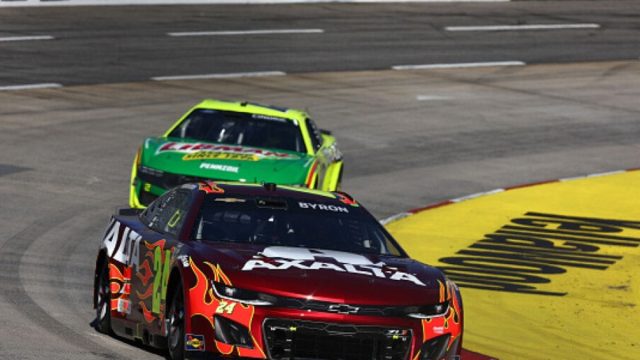2024 Cook Out 400 TV Ratings: The 2024 Cook Out 400 at Richmond Raceway experienced a notable decline in television ratings, registering a 1.2 rating and 2.22 million viewers, down from the previous year’s figures. This downturn is largely attributed to the controversial finish involving Austin Dillon, whose aggressive tactics during the overtime period raised questions regarding racing ethics and the integrity of competition. As the top non-Olympic sports event that week, the implications of this incident extend beyond mere numbers, prompting a critical examination of its effects on viewer engagement and the broader narrative within NASCAR. What does this mean for the future of the sport?
Key Highlights
- The 2024 Cook Out 400 achieved a 1.2 rating and 2.22 million viewers, marking a decline from 2023’s 1.4 rating and 2.43 million viewers.
- Ratings drop coincided with the Closing Ceremonies of the Paris Olympics, impacting overall viewership.
- Austin Dillon’s controversial overtime finish sparked debates on racing ethics and competitive integrity, potentially affecting audience perception.
- Joey Logano criticized Dillon’s aggressive tactics, labeling them as excessive and raising concerns for driver safety and competition integrity.
- Ongoing discussions on Dillon’s actions may influence driver accountability and future NASCAR viewership trends, reflecting a divided public opinion.
Cook Out 400 Ratings and Viewership
In the context of competitive sports viewership, the Cook Out 400, held at Richmond Raceway, garnered considerable attention despite facing formidable competition from the Closing Ceremonies of the Paris Olympics. The race, part of the NASCAR Cup Series, achieved a 1.2 rating and attracted 2.22 million viewers on the USA Network.
While these figures indicate a decline from the previous year’s 1.4 rating and 2.43 million viewers, it is vital to contextualize this drop within the competitive landscape of television programming.
The notable viewership for the Cook Out 400 is particularly remarkable as it emerged as the top non-Olympic sports event of the week. This achievement highlights NASCAR’s ability to draw audiences even when competing against major global events like the Olympics. The ratings dip can be partially attributed to the overlap with the high-profile Olympic ceremonies, which traditionally attract large audiences.
Furthermore, the race’s outcome, marked by a controversial victory from Austin Dillon, may have fueled discussions among fans and analysts similarly, potentially influencing future viewership dynamics. While the immediate ratings reflect a decline, the narrative surrounding the event may have lasting implications for fan engagement and interest in subsequent races.
Altogether, the Cook Out 400 exemplifies the complexities of sports viewership, demonstrating that competition, event timing, and narrative context are crucial factors in understanding audience behavior in contemporary broadcasting.
Austin Dillon’s Controversial Actions
A notable turning point in the Cook Out 400 occurred during the overtime finish, where Austin Dillon‘s controversial handling drew considerable scrutiny. The race, which had seen limited action, dramatically shifted as Dillon collided with both Denny Hamlin and Joey Logano, ultimately securing the victory. This aggressive maneuver sparked debate among fans and analysts regarding the ethics of racing tactics.
Dillon defended his actions in post-race interviews, asserting that his primary objective was to win. He explained his approach in the final laps, stating, “I mean, I was just trying to get to him,” referencing his attempt to displace Logano. By entering turn three aggressively in fifth gear, Dillon aimed to create a favorable position, but his actions inadvertently led to the wreck involving Hamlin. He characterized the subsequent contact with the 11 car as a mere reaction, emphasizing that his focus was on the 22 car and the unfolding race dynamics.
“I went into turn three in fifth gear, and drove in, tried to get in loose, got him up the track. I got the car downshifted, and the car actually turned pretty good when I did that. When I was coming back left, the 11 was coming. That was just kind of a reaction.”
“The 22 was trying to get him loose, but the 11 was more of just a reaction. I wasn’t lifting at that point because I was more looking at where the 22 was. When the 11 came across, it was just reaction.” – Dillon
Critics argue that Dillon’s approach raises questions about the integrity of competitive racing, as his tactics leaned towards recklessness rather than strategic skill. The incident not only affected the outcome of the race but also influenced viewer perceptions, contributing to a drop in TV ratings post-event.
Joey Logano’s Reaction to the Incident
Following the contentious finish of the Cook Out 400, Joey Logano expressed his frustration regarding Austin Dillon’s aggressive tactics during the overtime laps. Logano, who held the lead before the incident, was vocal about the perceived recklessness of Dillon’s action, which he deemed excessive and unjustifiable.
“It’s chicken shit. There’s no doubt about it,” Logano stated, emphasizing that Dillon was “four car lengths back, not even close” when he initiated contact that resulted in a notable wreck involving another competitor, the No. 11 car.
“It’s chicken shit. There’s no doubt about it. He is four car lengths back, not even close. Then he wrecks the 11 to go along with it.”- Logano
Logano’s critique extended beyond mere frustration; he articulated a broader concern regarding the normalization of such aggressive driving strategies within the sport. He acknowledged the concept of the “bump-n-run” as a legitimate racing tactic but firmly rejected Dillon’s approach, emphasizing that it crossed a line when executed from such a substantial distance.
“I get bump-n-runs. I do that. I would expect it. But from four car lengths back, he was never going to make the corner. Then he wrecks the other car, wrecks the 11 to go with it. What a piece of crap.” – Logano
“He came in there and just drove through me. It’s ridiculous that that’s the way we race,” Logano lamented, highlighting the dangerous implications of such actions for both drivers and the integrity of the competition.
In his remarks, Logano also expressed disbelief at Dillon’s post-race demeanor, where he offered thanks and praise after a reckless act that had notable consequences.
“Then he’s going to go up there and thank God and praise everything with his baby. It’s a bunch of BS. It’s not even freakin’ close. Dude, I get it, bump-n-run. I get it. I didn’t back up the corner at all. He came in there and just drove through me. It’s ridiculous that that’s the way we race. Unbelievable.”- Logano
This incident encapsulates a growing tension within NASCAR, as drivers grapple with the balance between aggressive racing and safety, raising crucial questions about the evolving standards of conduct on the track.
NASCAR’s Response to the Incident
As NASCAR officials assess the controversial finish of the Cook Out 400, the organization faces a vital moment in addressing the aggressive driving tactics that have sparked debate among competitors and fans similarly. The incident at Richmond Raceway has prompted an extensive review, with a focus on the actions of driver Austin Dillon and others involved. This scrutiny is imperative, as it not only pertains to the individual drivers but also reflects on NASCAR’s commitment to maintaining safety and sportsmanship within the sport.
The potential for penalties looms over the involved parties, with officials deliberating on the appropriateness and severity of any disciplinary measures. Such outcomes could have far-reaching implications, affecting the championship standings and influencing the dynamics of upcoming races. The prospect of sanctions serves as a reminder of NASCAR’s stance on aggressive driving, which has been a recurring theme in recent discussions.
NASCAR’s response will likely hinge on a thorough analysis of the incident, including video footage and telemetry data. The organization must balance the need for accountability with the understanding that racing inherently involves a degree of risk and competition.
Public and Media Reactions
Notable reactions have emerged from both the public and media in the wake of the Cook Out 400, particularly regarding Austin Dillon‘s controversial driving tactics. The race’s outcome has ignited a fervent debate among fans, with opinions sharply divided on the legitimacy of Dillon’s actions. Some argue that his aggressive approach was a necessary strategy in the high-stakes environment of NASCAR, where split-second decisions can determine victory or defeat.
Media outlets have echoed these sentiments, providing extensive coverage of the incident and its implications for NASCAR. Analysts have dissected the final laps, with expert commentators weighing in on the ethics of Dillon’s actions. The discourse reflects a broader conversation about the balance between competitive edge and sportsmanship within motorsports.
Additionally, the incident has drawn parallels to historical controversies within NASCAR, prompting discussions on how driving behavior shapes fan perceptions and the sport’s reputation.
As the narrative unfolds, the tension surrounding Dillon’s actions may have lasting ramifications, influencing both public sentiment and viewership trends. The polarized reactions serve to highlight the inherent drama of NASCAR, suggesting that while ratings may have suffered in the short term, the ongoing dialogue could ultimately improve engagement with the sport.
News in Brief: 2024 Cook Out 400 TV Ratings
The decline in TV ratings for the 2024 Cook Out 400 emphasizes the notable impact of controversial racing incidents on viewer engagement. Austin Dillon’s aggressive tactics during the overtime finish not only raised questions regarding racing ethics but also elicited strong reactions from fans and competitors similarly. This situation highlights the delicate balance between competitive strategy and the integrity of the sport, suggesting that such controversies may lead to long-term implications for NASCAR’s audience retention and comprehensive reputation.
ALSO READ: Austin Dillon Wins Cook Out 400 in Controversial Fashion: Logano and Hamlin Take Hits



